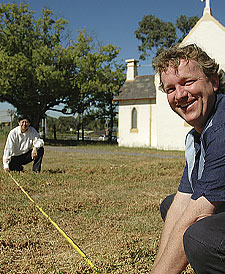Christian concern regarding climate change has increased both in Australia and worldwide.
However, by and large, evangelicals have not treated climate change as a pressing issue until recently.
Many have required considerable convincing before becoming persuaded that it is a real problem and a matter of concern for evangelical Christians.
Evangelicals worldwide are now placing increased emphasis on the importance of caring for God's creation. Christianity Today has written editorials against global warming. Prominent evangelicals such as Chuck Colson and James Dobson signed the Evangelical Call to Civic Responsibility, a document asserting that “God-given dominion is a sacred responsibility to steward the earth and not a license to abuse the creation”.
The Sydney Diocese's Social Issue Executive (SIE) recently published two briefings entitled Steadying Ourselves and Two Evangelical Views which address climate change.
The SIE quote findings from the Climate Action Network of Australia that "the impacts of greenhouse gas emissions will disproportionately affect those societies who have contributed least to the problem.
Yet the worst offenders, including Australia and the United States, continue to pollute at historically high levels.
These findings implicate Australian citizens as part of an international problem. What responsibility do Sydney Anglicans have to help reverse these disturbing trends?
How are Sydney Anglicans responding?
 The rector of Rouse Hill Anglican Church, the Rev Martin Morgan (pictured) is in the process of finalising plans for the new four-storey ministry education centre that will be built on the Rouse Hill Windsor Road site.
The rector of Rouse Hill Anglican Church, the Rev Martin Morgan (pictured) is in the process of finalising plans for the new four-storey ministry education centre that will be built on the Rouse Hill Windsor Road site.
Manager of Diocesan Property and Development, Hovel Hovhanesian has assisted Mr Morgan in the 12-month process by creating the building's design concept and planning all environmental and strategic issues.
"Environmental sustainability has been a major part of our planning process. We wanted to ensure this was a building for the future," he says.
The building will be energy efficient using natural ventilation and airconditioning systems that automatically reduce output based on the number of occupants in the building.
All lighting will be low voltage and low energy. Taps and toilets will have timing devices to reduce water usage.
Water that seeps into the ground will be channelled into soft landscape areas to keep the land constantly moist and save on ongoing irrigation.
The architect responsible for the new St John's, Robertson building is Michael Jones of Intelligent Architecture.
Michael, who attends St John's, Willoughby East, says the nearly completed Robertson building has been designed with environmental sustainability in mind.
"Being environmentally sustainable is important because of increased awareness and this has been accelerated through government legislation.
“While it costs more in the initial outlay, it means lower maintenance and operating costs for future generations."
Canberra Anglicans leading the way
While the Sydney Diocese has been putting climate change higher on its agenda and incorporating environmental sustainability into building projects, the Diocese of Canberra-Goulburn is one of the leading Australian Anglican Dioceses in addressing issues relating to climate change.
The Commission for the Environment was set up at Canberra-Goulburn synod in 2002.
The Canberra-Goulburn Diocese's Chair of the Commission for the Environment, Dr Barry Richardson, says it is irresponsible for Christians to ignore environmental issues.
"Adam's role of stewardship in the garden symbolises our role in the world.
"If you are not worried about what you will say to God when you get to Heaven having driven a V8 four-wheel drive when it was not necessary, you should be.
It is irresponsible to say you love your neighbour but not to respond to climate change," he says.
The Commission has since commenced a number of initiatives including a website containing "Creation Sunday' liturgies which Canberra parishes will use in mid-September to celebrate Creation Sunday.
"Our role is to help Christians come to grips with the Creator and our relationship with him, and to get good, solid teaching on this relationship," he says.
The Commission has also created a report on "Green Buildings'. It encourages parishes proposing new church buildings or serious renovation to design buildings that minimise the total environmental impact.
Local energy company ACTEWAGL has helped Canberra Diocesan offices, St Mark's Library, and all Anglican schools in the ACT to undertake energy retrofits.
"We are in the process of retrofitting our buildings for efficient energy use,” says Dr Richardson.
“ACTEWAGL made a series of suggestions and explained that the initial capital cost outlay is outweighed by the savings in the years that follow. You are saving energy, saving carbon and so being more responsible.”
Our responsibility
In recent years groups like the Environmental Evangelical Network (EEN) have formed to "declare the Lordship of Christ over all creation".
They see environmental problems as fundamentally spiritual problems. "One of the simplest, most profound of Jesus' teachings is the Golden Rule: ‘Do to others as you would have them do to you’. When we choose to cause pollution that hurts people, we violate the Golden Rule and the Great Commandments. Our contribution to pollution runs counter to Jesus' Lordship in our lives," says the EEN.
Is there environmentally irresponsible behaviour that we have to repent of and change?





















